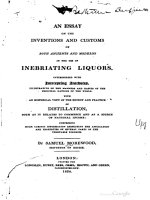AN ESSAY ON THE NATURE ftf SIGNIFICANCE OF ECONOMIC SCIENCE phần 1 pps
Bạn đang xem bản rút gọn của tài liệu. Xem và tải ngay bản đầy đủ của tài liệu tại đây (766.48 KB, 18 trang )
AN ESSAY
ON THE
NATURE
ftf
SIGNIFICANCE
OF ECONOMIC SCIENCE
BY
LIONEL ROBBINS
Professor
of
Economics
in the
University of London
SECOND EDITION, REVISED
AND
EXTENDED
MACMILLAN
AND CO.,
LIMITED
ST.
MARTIN'S STREET, LONDON
i945
COPYRIGHT
First Edition, 1932
Second Edition, 1935
Seprtnted,
1937,1940
and 1945
PRINTED TN GKEAT BRITAIN
TO MY FATHER
PREFACE TO THE SECOND EDITION
THE
first edition of this essay has been out of print
for some time, but apparently some demand for it
continues. I have therefore taken advantage of the
publisher's decision to reprint to introduce certain
alterations and improvements which experience since
it was first written seemed to make desirable.
In making these revisions I have not found it
necessary to change substantially the main trend of the
argument. Public criticism has tended to focus upon
the denial in Chapter VI. of the scientific legitimacy
of interpersonal comparisons of utility. I am afraid
that without the least disposition to be intransi-
gent, here or elsewhere, I am still quite unconvinced.
I contended that the aggregation or comparison of
the different satisfactions of different individuals
involves judgments of value rather than judgments
of fact, and that such judgments are beyond the
scope of positive science. Nothing that has been
said by any of my critics has persuaded me that
this contention is false. Beyond a few supplementary
remarks intended to elucidate matters further, there-
fore,
I have left this section unaltered. I hope that
my critics (some of whom seemed to assume that I
was a very combative fellow indeed) will not regard
this as a gesture of unfriendly defiance. I assure them
I am not at all cocksure about any of my own ideas.
But, in spite of the disposition of some of them to
refer to this and other well-known propositions as
vii
viii SIGNIFICANCE OF ECONOMIC SCIENCE
"Robbinsian Economics," it is not my own, and the
weight of the authorities by whom it has been pro-
pounded encourages me to believe that in this case, at
least, my own lights have not led me astray.
On the other hand, many of my critics have in-
ferred from my arguments in this connection certain
precepts of practice which I should be the first to
repudiate. It has been held that because I attempted
clearly to delimit the spheres of Economics and other
social sciences, and Economics and moral philosophy,
that therefore I advocated the abstention of the
economist from all interest or activity outside his
own subject. It has been held—in spite of activities
which I feared had become notorious—that I had
urged that economists should play no part in shaping
the conduct of affairs beyond giving a very prim
and restrained diagnosis of the implications of all
possible courses of action. My friend Mr. Lindley
Fraser was even led to urge upon me in an article en-
titled "How do we want Economists to Behave ?" more
socially-minded behaviour. Where so many have mis-
apprehended my intentions, I cannot flatter myself
that I was free from obscurity. But I do plead that
I did in fact state the contrary—as I thought, most
emphatically. In a footnote to Section 6, Chapter V.,
I stated, "It is more accuracy in mode of statement,
not over-austerity in speculative range, for which I
am pleading", and I went on to urge that economists
have probably high differential advantages as sociolo-
gists.
And in Section 4, Chapter VI., I went on to
say: "All this is not to say that economists should not
deliver themselves on ethical questions, any more than
an argument that botany is not æsthetics is to say
that botanists should not have views of their own on
PREFACE TO THE SECOND EDITION ix
the lay-out of gardens. On the contrary, it is greatly
to be desired that economists should have speculated
long and widely on these matters, since only in this
way will they be in a position to appreciate the im-
plications as regards
given
ends of problems which are
put to them for solution." I can only add to this that
I quite agree with Mr. Fraser that an economist who
is only an economist and who does not happen to be
a genius at his subject—and how unwise it is for any
of us to assume that we are that—is a pretty poor
fish. I agree, too, that by itself Economics affords no
solution to any of the important problems of life. I
agree that for this reason an education which consists
of Economics alone is a very imperfect education. I
have taught so long in institutions where this is re-
garded as a pedagogic axiom that any omission on
my part to emphasise it further is to be attributed to
the fact that I assumed that everybody would take it
for granted. All that I contend is that there is much
to be said for separating out the different kinds of
propositions involved by the different disciplines
which are germane to social action, in order that we
may know at each step exactly on what grounds we
are deciding. I do not believe that Mr. Fraser really
disagrees with me here.
jln exactly the same way I would plead that it is
a complete misunderstanding of my position to con-
tend that because I have emphasised the conventional
nature of the assumptions underlying many of the so-
called "measurements" of economic phenomena, I am
therefore "opposed" to the carrying out of operations
of this sort. It does seem to me to be a matter of great
importance to recognise very clearly that in com-
puting such aggregates as the national income or the
x SIGNIFICANCE OF ECONOMIC SCIENCE
national capital we are making assumptions which
are not reached by scientific analysis, but which are
essentially conventional in character. But, as I urged
in the body of the essay (pp. 57 and 62), this is not in
the least to say that, provided we are fully conscious of
the implications of our procedure, there
is
any objection
to such computations. On the contrary, it is clear that
not enough of this sort of thing has been done in the
past, and that much is to be expected from its exten-
sion in the future. Recognition of this, however, is
not incompatible with the view that it is desirable
to know at each step where we are merely recording
facts,
and where we are evaluating these facts by
arbitrary measures, and it is just because these
things are so frequently confused that I still main-
tain that emphasis on their dissimilarity is not
uncalled for.
There is, however, a part of the essay where re-
vision has seemed to be much more incumbent. I have
never been satisfied with the chapter on the nature of
economic generalisations. I am not conscious of any
fundamental change of opinion on these matters. But
I do think that in my eagerness to bring out as
vividly as possible the significance of certain recent
innovations I was led in certain places to a simplifica-
tion of emphasis and to a looseness in the use of
logical terms, apt to be misleading outside the context
of my own thought: and the fact that, while some
critics have reproached me with "barren scholas-
ticism", others have accused me of "behaviourism",
has not permitted me completely to comfort myself
with the belief that I elucidated satisfactorily the
correct position between these extremes. Accordingly
I have rewritten large parts of this chapter, and I have
PREFACE TO THE SECOND EDITION xi
also extended its scope to cover certain more complex
topics, such as the meaning of the assumption of purely
rational conduct, which, in the earlier version, I had
omitted in order not to overload the exposition. I am
afraid this makes this part of the book at once more
difficult and more contentious. But although I am
acutely aware of its imperfections, it satisfies my con-
science more than my earlier attempt to deal with such
matters only by implication. The opening section of
Chapter V. has also been rewritten, and I have intro-
duced additional paragraphs in Section 2, in which I
develop a little further my reasons for believing the
importance of the contrast between the qualitative
laws discussed in the preceding chapter and the quan-
titative "laws" of statistical analysis. I have also
added short sections in Chapters IV. and V. dealing
with the relations between statics and dynamics and
the possibility of a theory of economic development—
matters upon which there seems to exist some unneces-
sary confusion. I hope that the changes I have made
will be acceptable to my friends Professor F. A. von
Hayek, Dr. P. N. Rosenstein Rodan and Dr. A. W.
Stonier, whose advice and criticisms on these diffi-
cult matters have taught me much. They naturally
are not responsible for any mistakes which may have
crept in.
I have wondered very much what I ought to do
about the various attacks on my work which have
been made by Professor R. W. Souter. I have read
Professor Souter's strictures with interest and respect.
As I have said already, I am not convinced by anything
that he says about what he calls the "positivism" of
my attitude. So far as this part of his case is con-
cerned Professor Souter must demolish, not me, but
xii SIGNIFICANCE OF ECONOMIC SCIENCE
Max Weber: and I think Max Weber still stands, tà¤t
with much of what he says, particularly with regard
to the desirability of transcending the rather trite
generalisations of elementary statics, I am in cordial
agreement. Where I part company with him is in
the belief that it is possible to do this without sacri-
ficing precision and without regarding the essential
static foundations as useless. My acquaintance with
the findings of modern mathematical physics and
astronomy is not great, but I question whether the
eminent scientists to whom he makes appeal would
share his apparently very low opinion of the methods
of mathematical economics, however much they felt
that its results were still in a very elementary stage.
In this respect I am in fairly complete agreement
with what has been said already by Professor Knight.
1
I cannot help feeling, too, that, so far as this essay
is concerned, one or two inadvertent acerbities of
exposition have so angered Professor Souter that he
has really misunderstood my position much more
than would otherwise have been the case. I regret
this,
but it is difficult to know what to do about
it. At one or two points I have tried to make things
clearer. But to defend myself against all these mis-
understandings would involve so great an overloading
with personal apologia of what is perhaps already an
unduly protracted essay that I fear I should become
totally unreadable. I do not wish to appear dis-
courteous, and I hope, if time permits me to complete
various works now projected, to be able to do some-
thing to persuade Professor Souter that my claim that
he has misunderstood me is not unjustified.
1
"Economic Science in Recent Discussion", American Economic Revitw,
vol.
xxiv., pp. 225-238.
PREFACE TO THE SECOND EDITION xiii
For the rest I have made only small changes. I
have deleted certain footnotes whose topical relevance
has waned, and I have endeavoured to eliminate
certain manifestations of high spirits no longer in
harmony with present moods. But nothing short of
complete rewriting could conceal the fact that, for
better or worse, the essay was written some time
ago—large parts of it were conceived and drafted
years before publication—and although I think it is
perhaps worth reprinting, I do not think it is worth
the time that that would involve. So with all the
crudities and angularities that remain I commend it
once more to the mercies of its readers.
LIONEL BOBBINS.
THE LONDON SCHOOL OP ECONOMICS,
May, 1935.
PREFACE TO THE FIRST EDITION
THE
purpose of this essay is twofold. In the first
place, it seeks to arriye at precise notions concerning
the subject-matter of Economic Science and the
nature of the generalisations of which Economic
Science consists. Secondly it attempts to explain the
limitations and the significance of these generalisa-
tions,
both as a guide to the interpretation of reality
and as a basis for political practice. At the present
day, as a result of the theoretical developments of the
last sixty years, there is no longer any ground for
serious differences of opinion on these matters, once
the issues are clearly stated. Yet, for lack of such
statement, confusion still persists in many quarters,
and false ideas are prevalent with regard to the pre-
occupations of the economist and the nature and the
extent of his competence. As a result, the reputation
of Economics sutlers, and full advantage is not taken
of the knowledge it confers. This essay is an attempt
to remedy this deficiency—to make clear what it is
that economists discuss and what may legitimately
be expected as a result of their discussions. Thus on
the one hand it may be regarded as a commentary
on the methods and assumptions of pure theory: on
the other hand, as a series of prolegomena to work
in Applied Economics.
xiv
PREFACE TO THE FIRST EDITION xv
The object of the essay necessitates the taking of
broad
views.
But my aim throughout has been to keep
as close to earth as possible. I have eschewed philo-
sophical refinements as falling outside the province in
which I have any claim to professional competence;
and I have based my propositions on the actual
practice of the best modern works on the subject.
In a study of this sort, written by an economist for
fellow-economists, it seemed better to try to drive
home the argument by continual reference to accepted
solutions of particular problems, than to elaborate,
out of the void, a theory of what Economics should
become. At the same time, I have tried to be
brief.
My object has been to suggest a point of view
rather than to treat the subject in all its details. To
do this it seemed desirable to be concise even at the
expense of sacrificing much material which I had
originally collected. I hope, however, at a later stage
to publish a work on general Economic Theory in
which the principles here laid down are further illus-
trated and amplified.
For the views which I have advanced, I make no
claim whatever to originality. I venture to hope that
in one or two instances I have succeeded in giving
expository force to certain principles not always
clearly stated. But, in the main, my object has been
to state, as simply as I could, propositions which are
the common property of most modern economists.
I owe much to conversations with my colleagues and
pupils at the School of Economics. For the rest
I have acknowledged in footnotes the debts of which
I am chiefly conscious. I should like, however, once
more to acknowledge my especial indebtedness to
xvi SIGNIFICANCE OF ECONOMIC SCIENCE
the works of Professor Ludwig von Mises and to the
Commonsense
of Political Economy of the late Philip
Wicksteed. The considerable extent to which I have
cited these sources is yet a very inadequate reflection
of the general assistance which I have derived from
their use.
LIONEL ROBBINS.
THB LONDON SCHOOL OP ECONOMICS,
February, 1932.
CONTENTS
PAGE
PREFACE TO THE SECOND EDITION vii
PREFACE TO THE FIRST EDITION xiv
CHAPTER I
THE SUBJECT-MATTER OF ECONOMICS
1.
Introduction 1
2.
The "Materialist" Definition of Economics . . 4
3.
The "Scarcity" Definition of Economics . . l¾
4.
Economics and the Exchange Economy . . 16
5.
The "Materialist" and "Scarcity" Definitions
Compared 21
CHAPTER II
ENDS AND MEANS
1.
Introduction 24
2.
Economics and Ends 24
3.
Economics and the Æsthetic 28
4.
Economics and Technology 32
5.
Economic Theory and Economic History . . 38
6. The Materialist Interpretation of History . . 42
CHAPTER III
THE RELATIVITY OF ECONOMIC "QUANTITIES"
1.
The Meaning of Scarcity 46
2.
The Concept of an Economic Good . „ 46
3.
The "Fallacy of Misplaced Concreteness" . . 49
4.
The Meaning of Economic Statistics 54
5.
The Significance of Time Series 59
6. "Production - Distribution" versus "Equilibrium"
Analysis , . 63
xvii
xviii SIGNIFICANCE
OF
ECONOMIC SCIENCE
CHAPTER
IV
THE
NATURE OF ECONOMIC GENERALISATIONS
PA¢1B
1.
Introduction
72
2.
The
Foundations
of
Economic Analysis
. . 72
3.
Economic
Law
and the
"Historico-Relative"
. 79
4.
Economics
and
Psychology
83
5.
The
Assumption
of
Rational Conduct
90
6.
The
Mythology
of
Homo Œconomicus
. . .94
7. Statics
and
Dynamics
99
CHAPTER
V
ECONOMIC GENERALISATIONS
AND
REALITY
1. Economics
as a
Science
104
2.
Statistical "Laws"
of
Supply
and
Demand
. . 106
3.
The
"Quantitative Economics"
of the
Institu-
tionalists
112
4.
The
Function
of
Empirical Studies
. . .115
5.
The
Inevitability
of
Economic
Law
. . .121
6.
The
Limitations
of
Economic
Law . . .126
7.
The
Possibility
of a
Theory
of
Economic Develop-
ment
131
CHAPTER
VI
THE SIGNIFICANCE
OF
ECONOMIC SCIENCE
1. Introduction
. . . . . . .136
2.
The Law of
Diminishing Marginal Utility
. . 136
3.
The
Neutrality
of the
Theory
of
Equilibrium
. . 143
4.
Economics
and
Ethics
. . . . . .147
5.
The
Significance
of
Economic Science
. . .151
INDEX
OF
AUTHORS CITED
159
CHAPTER I
THE SUBJECT-MATTER OP ECONOMICS
1.
THE
object of this Essay is to exhibit the nature
and significance of Economic Science. Its first task
therefore is to delimit the subject-matter of Economics
—to provide a working definition of what Economics
is about.
Unfortunately, this is by no means as simple as
it sounds. The efforts of economists during the last
hundred and fifty years have resulted in the establish-
ment of a body of generalisations whose substantial
accuracy and importance are open to question only
by the ignorant or the perverse. But they have
achieved no unanimity concerning the ultimate nature
of the common subject-matter of these generalisa-
tions.
The central chapters of the standard works on
Economics retail, with only minor variations, the
main principles of the science. But the chapters in
which the object of the work is explained still present
wide divergences. We all talk about the same things,
but we have not yet agreed what it is we are talking
about.
1
1
Lest this should be thought an overstatement I subjoin below a few
characteristic definitions. I have confined my choice to Anglo-Saxon
literature because, as will be shown later on, a more satisfactory state of
affairs is coming to prevail elsewhere. " Economics is a study of mankind in
the ordinary business of life; it examines that part of individual and social
action which is most closely connected with the attainment and with the
use of the material requisites of well-being" (Marshall,
Principles,
p. 1).
1
2 SIGNIFICANCE OF ECONOMIC SCIENCE OH.
This is not in any way an unexpected or a disgrace-
ful circumstance. As Mill pointed out a hundred years
ago,
the definition of a science has almost invariably,
not preceded, but followed the creation of the science
itself.
"Like the wall of a city it has usually been
erected, not to be a receptacle for such edifices as
might afterwards spring up, but to circumscribe an
aggregate already in existence."
1
Indeed, it follows
from the very nature of a science that until it has
reached a certain stage of development, definition of
its scope is necessarily impossible. For the unity of
a science only shows itself in the unity of the problems
it is able to solve, and such unity is not discovered
until the interconnection of its explanatory principles
has been established.
2
Modern Economics takes its
rise from various separate spheres of practical and
philosophical enquiry—from investigations of the
balance of trade—from discussions of the legitimacy
of the taking of interest.
3
It was not until quite recent
times that it had become sufficiently unified for the
"Economics is the science which treats phenomena (rom the standpoint of
price" (Davenport, Economics of Enterprise, p. 25). "The aim of Political.
Economy is the explanation of the general causes on which the material wel-
fare of human beings depends" (Cannan, Elementary Political Economy, p. 1)
"It is too wide a definition to speak of Economics as the science of the
material side of human welfare." Economics is "the study of the general
methods by which men co-operate to meet their material needs" (Beveridge,
Economics as a Liberal Education, Economica, vol. i., p. 3). Economics,
according to Professor Pigou, is the study of economic welfare, economic
welfare being defined as " that part of welfare which can be brought directly
or indirectly into relation with the measuring rod of money" (Economics of
Welfare, 3rd edition, p. 1). The sequel will show how widely the implications
of these definitions diverge from one another.
1
Unsettled Questions of Political Economy, p. 120.
s
"Nicht die 'sachlichen` Zusammenhänge der 'Dinge' sondern die
gedanklichen Zusammenhänge der Probleme liegen den Arbeitagebíeten der
Wissenschaften zugrunde" (Max Weber, Die Objectivilät sozialwissenschaft-
licher und sozialpolitischer Erkenntnis, Oesammelle Aufsätze zur Wissen-
schaftslehre, p. 166).
J
See Cannan, Review of Economic Theory, pp. 1-35, and Schumpeter,
Ej>ochen
der îlethoden- und Dogmengeschickte, pp. 21-38.









